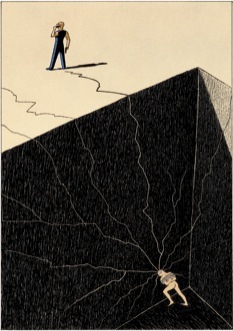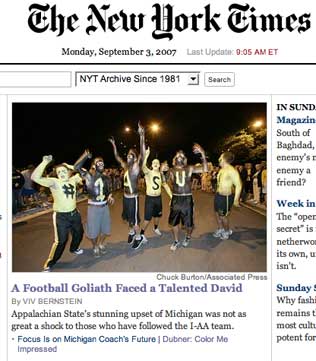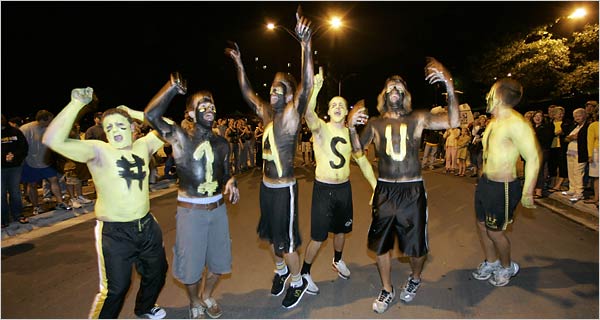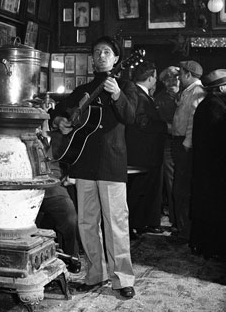A person involved in the Council of Europe inquiry, referring to cavity searches and the frequent use of suppositories during the takeout of detainees, likened the treatment to "sodomy." He said, "It was used to absolutely strip the detainee of any dignity. It breaks down someone's sense of impenetrability. The interrogation became a process not just of getting information but of utterly subordinating the detainee through humiliation." The former C.I.A. officer confirmed that the agency frequently photographed the prisoners naked, "because it's demoralizing." The person involved in the Council of Europe inquiry said that photos were also part of the C.I.A.'s quality-control process. They were passed back to case officers for review....
In the process of being transported, C.I.A. detainees such as [Khalid Sheikh] Mohammed were screened by medical experts, who checked their vital signs, took blood samples, and marked a chart with a diagram of a human body, noting scars, wounds, and other imperfections. As the person involved in the Council of Europe inquiry put it, "It's like when you hire a motor vehicle, circling where the scratches are on the rearview mirror. Each detainee was continually assessed, physically and psychologically."...
He has alleged that he was attached to a dog leash, and yanked in such a way that he was propelled into the walls of his cell. Sources say that he also claimed to have been suspended from the ceiling by his arms, his toes barely touching the ground. The pressure on his wrists evidently became exceedingly painful.
Ramzi Kassem, who teaches at Yale Law School, said that a Yemeni client of his, Sanad al-Kazimi, who is now in Guantánamo, alleged that he had received similar treatment in the Dark Prison, the facility near Kabul. Kazimi claimed to have been suspended by his arms for long periods, causing his legs to swell painfully. "It's so traumatic, he can barely speak of it," Kassem said. "He breaks down in tears." Kazimi also claimed that, while hanging, he was beaten with electric cables.
According to sources familiar with interrogation techniques, the hanging position is designed, in part, to prevent detainees from being able to sleep. The former C.I.A. officer, who is knowledgeable about the interrogation program, explained that "sleep deprivation works. Your electrolyte balance changes. You lose all balance and ability to think rationally. Stuff comes out." Sleep deprivation has been recognized as an effective form of coercion since the Middle Ages, when it was called tormentum insomniae. It was also recognized for decades in the United States as an illegal form of torture. An American Bar Association report, published in 1930, which was cited in a later U.S. Supreme Court decision, said, "It has been known since 1500 at least that deprivation of sleep is the most effective torture and certain to produce any confession desired."
Under President Bush's new executive order, C.I.A. detainees must receive the "basic necessities of life, including adequate food and water, shelter from the elements, necessary clothing, protection from extremes of heat and cold, and essential medical care." Sleep, according to the order, is not among the basic necessities....
 Professor Kassem said his Yemeni client, Kazimi, had told him that, during his incarceration in the Dark Prison, he attempted suicide three times, by ramming his head into the walls. "He did it until he lost consciousness," Kassem said. "Then they stitched him back up. So he did it again. The next time, he woke up, he was chained, and they'd given him tranquillizers. He asked to go to the bathroom, and then he did it again." This last time, Kazimi was given more tranquillizers, and chained in a more confining manner.
Professor Kassem said his Yemeni client, Kazimi, had told him that, during his incarceration in the Dark Prison, he attempted suicide three times, by ramming his head into the walls. "He did it until he lost consciousness," Kassem said. "Then they stitched him back up. So he did it again. The next time, he woke up, he was chained, and they'd given him tranquillizers. He asked to go to the bathroom, and then he did it again." This last time, Kazimi was given more tranquillizers, and chained in a more confining manner.
The case of Khaled el-Masri, another detainee, has received wide attention. He is the German car salesman whom the C.I.A. captured in 2003 and dispatched to Afghanistan, based on erroneous intelligence; he was released in 2004, and Condoleezza Rice reportedly conceded the mistake to the German chancellor. Masri is considered one of the more credible sources on the black-site program, because Germany has confirmed that he has no connections to terrorism. He has also described inmates bashing their heads against the walls. Much of his account appeared on the front page of the Times. But, during a visit to America last fall, he became tearful as he recalled the plight of a Tanzanian in a neighboring cell. The man seemed "psychologically at the end," he said. "I could hear him ramming his head against the wall in despair. I tried to calm him down. I asked the doctor, ‘Will you take care of this human being?'
(Read the whole thing.)
 Was anyone else troubled by the photo of Appalachian State football fans on the front page the NY Times website today? There's a different story featured on the front page now, but the photo is still heading the article.
Was anyone else troubled by the photo of Appalachian State football fans on the front page the NY Times website today? There's a different story featured on the front page now, but the photo is still heading the article.


 "I had to put on little white gloves and get yelled at for being too rough," Mr. Casey said. "But it's not like I had to search long and hard to find the right lyrics; half the lyrics sounded like a Dropkick Murphys song as soon as I read them."
"I had to put on little white gloves and get yelled at for being too rough," Mr. Casey said. "But it's not like I had to search long and hard to find the right lyrics; half the lyrics sounded like a Dropkick Murphys song as soon as I read them."
 Professor Kassem said his Yemeni client, Kazimi, had told him that, during his incarceration in the Dark Prison, he attempted suicide three times, by ramming his head into the walls. "He did it until he lost consciousness," Kassem said. "Then they stitched him back up. So he did it again. The next time, he woke up, he was chained, and they'd given him tranquillizers. He asked to go to the bathroom, and then he did it again." This last time, Kazimi was given more tranquillizers, and chained in a more confining manner.
Professor Kassem said his Yemeni client, Kazimi, had told him that, during his incarceration in the Dark Prison, he attempted suicide three times, by ramming his head into the walls. "He did it until he lost consciousness," Kassem said. "Then they stitched him back up. So he did it again. The next time, he woke up, he was chained, and they'd given him tranquillizers. He asked to go to the bathroom, and then he did it again." This last time, Kazimi was given more tranquillizers, and chained in a more confining manner.







Recent Comments